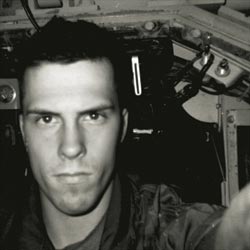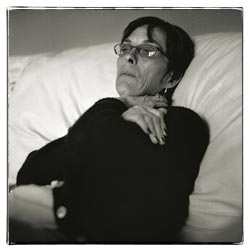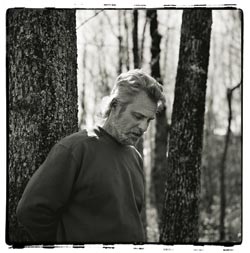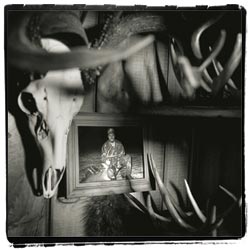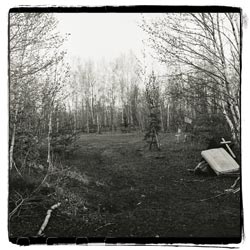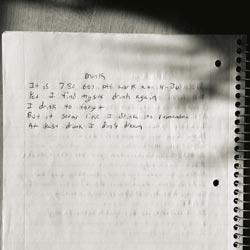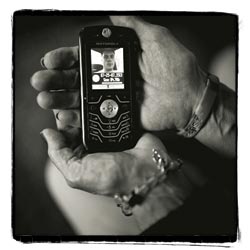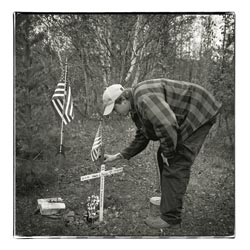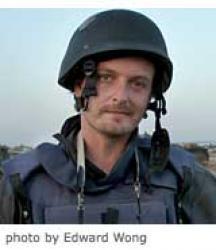Noah Pierce’s headstone gives his date of death as July 26, 2007, though his family feels certain he died the night before, when, at age twenty-three, he took a handgun and shot himself in the head. No one is sure what pushed him to it. He said in his suicide note it was impotence—a common side effect of post-traumatic stress disorder (PTSD). It was “the snowflake that toppled the iceberg,” he wrote. But it could have been the memory of the Iraqi child he crushed under his Bradley. “It must have been a dog,” he told his commanders. It could have been the unarmed man he shot point-blank in the forehead during a house-to-house raid, or the friend he tried madly to gather into a plastic bag after he had been blown to bits by a roadside bomb, or—as the fragments of Noah’s poetry might lead you to believe—it could have been the doctor he killed at a checkpoint.
Noah Pierce grew up in Sparta, Minnesota, a town of fewer than one thousand on the outskirts of the Quad Cities—Mountain Iron, Virginia, Eveleth, and Gilbert—on the Mesabi Iron Range. Discovered on the heels of the Civil War, the range’s ore deposit is the largest in the United States. These were the mines that made the Second Industrial Revolution. Range steel became the tracks of railroads, the wires of suspension bridges, the girders of skyscrapers. It became the weapons and artillery of the World Wars. WELCOME TO MOUNTAIN IRON, THE TACONITE CAPITAL OF THE WORLD reads a sign greeting visitors along the highway. There are so many open pit mines that the cities seem perched on tiny outcrops, overlooking gaping holes ready to engulf them. Around the clock, deep metallic groans come out of the ground, and freight trains barrel through, horns screeching. Blasting takes place so close to people’s houses, residents open their front doors so the pressure doesn’t blow out their windows. Locals are proud of their hardworking, hard-drinking heritage. There are more than twenty bars on Eveleth’s half-mile-long main street. On a typical night last May, when I was there, loudspeakers affixed to lampposts blared John Denver’s “Take Me Home, Country Roads,” and Harleys thundered through town. One bar closed early, when a drunk got thrown through the front window.
Right from the start, Noah had seemed ill-equipped for life on the range. He was a quiet, sensitive kid. He kept a tight circle of friends and passed time with them building tree forts and playing army in the woods. Noah’s biological father, Dale Pierce, a deep-sea diver who worked on oil rigs, separated from Noah’s mother shortly after she became pregnant, but Tom Softich, Noah’s stepfather, treated the thin-skinned boy as his own. When Noah turned six, Tommy began taking him hunting, and by thirteen Noah had his own high-powered rifle. For practice, they went rabbit shooting together at a small clearing a mile from their house. It became such a regular place to find Noah that his family and friends began referring to the clearing simply as “the spot.”
When Noah went missing in July 2007, after a harrowing year adjusting to home following two tours in Iraq, police ordered a countywide search. His friend Ryan Nelson thought he might know where to look. When he pulled up to the spot, he immediately recognized Noah’s truck. Inside, Ryan found his friend slumped over the bench seat, his head blown apart, the gun in his right hand. Half a bottle of Jack Daniel’s Special Blend lay on the passenger seat, and beer cans were strewn about. On the dash lay his photo IDs; he had stabbed each photo through the face. And on the floorboard was the scrawled, rambling suicide note. It was his final attempt to explain the horrors he had seen—and committed.
Noah Pierce was not the only veteran wrestling with depression and PTSD. This April, Ira R. Katz, Deputy Chief Patient Care Services Officer for Mental Health at the Department of Veterans Affairs, became embroiled in scandal when a memo surfaced in which he instructed members of his staff to suppress the results of an internal VA investigation into the number of veterans attempting suicide. Based on their surveys and tabulations from the NCHS’s National Death Index and the CDC’s National Violent Death Reporting System, Katz estimated that between 550 and 650 veterans are committing suicide each month. It is possible that the number of suicide deaths among veterans in 2008 alone will double the combined combat deaths in Iraq and Afghanistan since 2002. It pains Noah’s family and friends that the Pentagon will never add him—nor the thousands like him—to the official tally of 4,000-plus war dead.
Likewise, PTSD and traumatic brain injuries (TBI) are excluded from the count of 50,000 severe combat wounds—even though PTSD and TBI often have far greater long-term health effects than bullet wounds or even lost limbs. A recent study by the RAND Corporation found that one in five (approximately 300,000) Iraq and Afghanistan veterans suffer from depression or stress disorders and another 320,000 suffer from TBIs that place them at a higher risk for depression and stress disorders.
Noah’s mother, Cheryl, believes her son’s death could have been avoided had he received counseling. Statistically, veterans outside the VA system are four times more likely to attempt suicide than those within the system. Now Cheryl’s mission is to have a clause inserted into every standard military contract that would require veterans to visit a therapist every two weeks of the first year after a combat deployment. “Soldiers are taught to follow orders,” she told me. “It needs to be mandatory. Noah was an excellent soldier, and if it was mandatory, he would have gone faithfully to every appointment. But it wasn’t.”
Cheryl Softich is a slight, chain-smoking woman of fifty, whose disarmingly direct approach to conversation could easily be mistaken as brusque by an outsider. She sank into the oversize leather couch in her living room, recounting her twelve-hour labor, two days before Christmas 1983. She remembered the blinding pain of each contraction and smiled when she recalled the doctor asking permission for a group of twenty medical students to observe. “As long as you get this baby out of me, I don’t care who watches,” she said. But then Cheryl’s smile faded. “As soon as they put him in my arms, this feeling washed over me, and I knew instantly that I was going to outlive this child. Did not know how or why, but I was going to outlive this child.”
The feeling returned the day, not long after 9/11, that Noah came home with enlistment papers. He was a few months shy of eighteen and needed a parental signature. “He kind of put me between a rock and a hard place,” Cheryl said. “Either sign these papers and show you support me and my decision, or I’m signing them in a couple of months without your support. Well, no child of mine is going off to war thinking I don’t support him. Did I try to talk him out of it? Hell, yes. Did I finally give up trying to talk him out of it? Yes, because it was what he was going to do, so I accepted it, and I was proud of him for his decision.”
Not everybody was as understanding. “When he joined the army, my heart sank,” said Sally Galbraith, a family friend who was virtually a second mother to Cheryl’s children. “I thought, ‘Noah, you’re too sensitive, you’re too caring; how are you ever going to get through this?’”
In June 2002, Noah went to boot camp in Fort Stewart, Georgia, and began regularly writing letters home. He expressed surprise at seeing fellow soldiers break down in tears, homesick and scared, but admitted to feeling a little that way himself. “During practice we had to yell stupid stuff,” Noah wrote in August. “The Drill sergeant would ask, ‘What makes the green grass grow?’ We would yell, ‘blood, blood, blood makes the green grass grow.’”
The Iraq invasion began in March 2003. Noah’s unit—First Platoon, Bravo Battery, First Battalion, Third Air Defense Artillery—was assigned to the front line. He rolled northward in a Bradley Linebacker, a heavily armored infantry track vehicle equipped with surface-to-air Stinger missiles, but Saddam’s army had virtually no helicopters or jets, so Noah’s platoon was changed to infantry and tasked with kicking in doors and searching houses. By early April, American troops had reached Baghdad, and the airwaves were filled with images of Saddam’s statue toppling in Firdos Square and the troops being hailed as conquering heroes.
Noah was outraged. “War is horrible,” he scrawled in enormous letters across the back of the envelope of his first letter home from Iraq. “It fucking sucks here,” he wrote. “It sounds like you guys in the states are for the war. All the soldiers I know including me think it is a bunch of bullshit. We came in and invaded this country and murdered a lot of innocent people. So tell me how we are heros.”
Barely a month into the invasion, Noah already felt beset by the moral ambiguity of house-to-house raids. “I wish I would have been a driver during the war,” he wrote from Baghdad. “They didn’t have to see near as much shit as I had to go through. Plus you never had to shoot people in the drivers hatch. Even the gunner has it better. All they ever shot were vehicles, so they didn’t have to see the affects. Unlike when you shoot someone in the head at point blank range. Did they show that shit on T.V.?” The violation of bursting into someone’s home and the consequences of any errors haunted him. “What would you do if you were forced to clear buildings where they know there are enemy soldiers (keep in mind you’re not infantry and haven’t been trained for it) and you enter a room and you run into a soldier less than 6 inches from the end of your barrel? Plus, he’s on his knees with his hands on his head but you are scared out of your mind. Would you pull the trigger? Say you just shoot out of instinct like hunting, like when you suddenly flush a grouse (dad should know what I mean). Then, after, you realize what you did. Is that considered murder?”
The questions read as oblique confession, and Noah admitted that there were “some things I can’t even get myself to write about.” For some of those things, he had taken photographs—though he was uncertain what he would ever do with the images, whom he could show them to. “I will probably destroy the camera,” he wrote.
His unit was positioned near the airport, close to some of Saddam’s palaces. Noah was impressed by their scale; he liked the palm trees, and he enjoyed the sweet tea. But his unit’s turf was the Abu Ghraib neighborhood on the outskirts of Baghdad—home to the infamous prison and the last main road before Fallujah, the cradle of the insurgency. One night, Noah’s platoon went out on a mission to guard buildings against looters. While he was in the turret of his Bradley, a van drove toward him and someone started shooting. “I just grabbed my M16 and put it on 3 round burst and led the tracers into the drivers window,” Noah wrote in a letter a few days later. “Right away the van stopped. I just finished the magazine. I watched it for a minute and someone ran around from the passenger side and dragged (I assume the body) into the back seat. I didn’t shoot anymore and just let them leave. The gunner and track commander were asleep in the truck and didn’t wake up so I never mentioned it to anybody. I can’t wait until I get out of here and I hope I never have to do something like this again.”
The letter ended: “It’s definitely been an experience I’ll never forget, hopefully I will be able to forget most of it someday, but I doubt it.”
“Everything good Noah got from Tommy. From me he inherited an overly sensitive heart,” Cheryl said one afternoon, her voice quavering as she spoke. She wanted me to understand that, no matter the terrible things her son may have done, he was a good person. It was his sensitivity—her sensitivity—that burrowed under his skin, that would come to make him edgy and aggressive. By summer 2003, he was suffering constant nightmares and couldn’t sleep. “They are pretty much like the shit I went through,” he wrote his mother, “only my dreams are always weird, so they are kind of fucked up.” To blow off steam, he admitted, he and other members of his platoon had taken to abusing suspects. “Whatever they’d do for stress relief,” Cheryl explained, “hit a prisoner—because you’re so frustrated that you haul him off and slug him—well, Noah did those things along with the rest of them. The difference is, he suffered from it. He felt guilty afterwards.”
But with each passing day in the desert, Noah’s guilt was turning to anger, confusion, and, finally, despair. “I’m so pissed off right now,” he wrote in July. “Beatin’ a sandnigger unconscious would help but we will get in serious trouble if it happens again.” But soon the letters his parents received were stuffed with Iraqi dinars, stolen from civilians his unit had beaten and robbed.
“Well staying here has had one good impact on me,” Noah wrote. “I no longer regret what I did during the war. I have so much hatred in me I could go murder more sandniggers and I would just smile. That goes for almost everyone here. We had sympathy for them after the war but now we have absolutely nothing but hatred for them. We should have killed more during the war. I let all kinds of ‘innocent’ people go when I should have just mowed them down.”
By August, as their deployment drew to a close, Noah’s platoon was under a magnifying glass, so he and some of his friends found a new way to vent—stoning chickens. Close to Noah’s camp, two hens were kept in a hole deep enough that they couldn’t escape. Soldiers regularly pelted the hens with rocks until they were near death. One day, a sergeant caught them. “It was funny as hell,” Noah wrote. “He stood there watching in total disbelief for a good five minutes. Then he asked if we needed to talk to a chaplain. We told him we already talked to a psychiatrist and a chaplain and that it doesn’t help. He continued to watch like we were crazy then told us to quit.” Then, as a casual coda—almost an afterthought—Noah added: “Oh yeah, one of my friends that I do this with accidentally killed a 3 year old kid. He was shooting a SAW (fully automatic machine gun) at a car and a stray bullet caught this kid in the head. Oh well one less motherfucker that won’t grow up and continue this shit. Luckily he is not in any trouble. They are keeping it quiet though. Well fuck this place and I am going to vent some stress on the chickens and hopefully hoadjis later. I love you guys. Love, Noah.”
In September 2003, Noah’s fifteen months were up, and he was sent back to Fort Stewart. He took a two-week leave to go home. Cheryl was enormously proud of her son and told him often. “He’d get mad because he didn’t think there was anything to be proud of.”
“It’s kind of like the devil followed him home and wouldn’t let him be,” Tom Softich told me.
He was standing in ankle-deep water by Lake Vermilion, not far from the Canadian border, where he used to come with Noah to a tiny shack they’d built for hunting and fishing. “He was starting to say Satan had more power than God, right before he shot himself, but I told him that’s not true, it’s only if you let him. Noah was starting to think Satan was in control of everything, and I guess he is, if you let him.”
“I don’t have the answer,” Tommy said, his voice growing softer. “I know I feel that we failed him somehow. Who knows if you could have made a difference or not. I mean Cheryl feels that way more than anybody, being his mother. She probably tried her hardest to get help for him … But you know, everybody comes away feeling like a failure somehow, that you couldn’t, or didn’t, do anything about it.
“I tried to get his mind into other places. I’d do things with him that he liked to do. He didn’t talk about the war a whole lot. He’d talk to me about some of the equipment and stuff, and I’d just talk about hunting and fishing and stuff. Trying to get his mind away from it.”
For the first time in our days together, Tommy’s emotions got the better of him. He rasped an apology before starting to sob.
In February 2005, Noah returned to Iraq. He was assigned to a new unit—Bravo Troop, Fifth Battalion, Seventh Cavalry Regiment—and sent to Balad, a city of 100,000, forty miles north of Baghdad. Insurgent activity was at record levels, and immediately the unit began making contact with their elusive enemy. On one of their first patrols, Noah’s platoon found two IEDs. They disarmed them, arrested a man they suspected was responsible, and used the captured bombs to blow up the suspect’s house.
The carnage on all sides far surpassed anything Noah had seen six months earlier.
On February 27, Noah sent an anguished e‑mail home. “Well I had a really bad day mom,” it began. “First I totaled a hoadjies car, but I did that on purpose. but then we had to go back out for a second mission and i ran over a little boy on accident. I was the last vehicle and i ran him over on the left side so my crew didn’t see it. i told them later i must have hit a dog. the kid was between 8-10 years old only. hopefully the family doesn’t try and do anything because the army might think it was weird i total a car and kill a kid in a matter of a couple of hours. i feel really bad but i thought he would get out of my way.”
Noah wrote in his journal about the fear he had of roadside bombs, about friends who’d shot Iraqis and been put on suicide watch (“makes a person not even want to shoot back at a person”), and about his growing sense of isolation. “We have a lot of down time without much to do, so I do a lot of thinking. I have been realizing something. I have never had a true friend.” He kept a small graduation photograph of his sister, Sarah, with him, and would look at it during dark moments. He told her later it kept him alive. At just twenty-one years, Noah felt he could trust almost no one. “Lately I have been thinking I don’t even want to come back alive,” Noah wrote on March 15. “Granted I would never kill myself, but I hate life. If I died here, I would be young and it would be an honorable way to go. Let’s face it, I have no future when I get back.”
Violence in Balad increased, and the unit started losing men. The constant mortar fire coming into their camp killed a soldier, and roadside bombs were exploding virtually every time they crossed the wire. Twice, Noah was riding in the gun turret when they were hit; twice he escaped apparently unharmed. He said privately, however, that he was certain he had some traumatic brain injury—although later, back home, he would skip appointments to test for it, afraid of what they might confirm. “He didn’t want people looking at him like there was something wrong with him,” Cheryl told me. His journal entries and e‑mails home became darker as he struggled with the guilt and anger: “I hate all Iraqis except for the women (most), and the Iraqi national guard. The kids too.”
Noah felt alone, and other soldiers were struggling, too. At the end of April, he had to clear out of his living quarters when a medic became suicidal. “If this shit keeps up I will snap,” he wrote in his journal. “If I do, I’m just going to start killing mother-fuckers. Either Iraqis or soldiers, whatever sets me off. I doubt I will, but this is gonna be a stressful 8 months.”
His next entry is two weeks later: “So far, this has been the worst month of my life. With all this work I have been ready to snap. I don’t know how much I can take. A car pissed me off last night. The fucker kept flashing me and when he pulled off the road I almost ran him over. I changed my mind though, I could have gotten away with killing that mother-fucker though. My transmission was going out and I could have blamed it on that. I am just waiting for a good opportunity though. I am just waiting for the chance where I know people will die. I am not going to swerve at them, but I am not going to avoid it like I have been. The only reason I have avoided it so far is there have been women or kids in the cars coming at me.”
The entry closes, “I am a bad person.”
Jonathan Shay, a psychiatrist who has worked with combat vets for twenty years and authored two books about PTSD—or psychological and moral injury, as he insists it should be known—told me by phone from his Newton, Massachusetts, office, “It’s titanic pain that these men live with. They don’t feel that they can get that across, in part because they feel they deserve it, and in part because they don’t feel people will understand it.”
“Despair, this word that’s so hard to get our arms around,” he said. “It’s despair that rips people apart [who] feel they’ve become irredeemable.”
I told Dr. Shay about Noah’s experiences in Iraq, in particular the killing, the loss of comrades, the nightmares. He sounded saddened on the phone, but unsurprised. “The flip side of this fellow’s despair was the murderous rages he experienced on his second tour,” he said. “In combat, soldiers become each other’s mothers. The rage, need for revenge, and self-sacrificial commitment toward protecting each other when comrades are killed [are] akin to when a mother’s offspring are put in danger or killed.”
Dr. Shay explained the nightmares and sleeplessness were one of the major issues. “The lack of sleep contributed directly to a loss of control of his own anger, a loss of control of things he felt morally responsible for.”
By July 2005, Cheryl now believes, Noah had become desperate to kill. We were sitting in the kitchen, smoking. Cheryl stood up and went to her bedroom. She rifled through boxes of what looked like documents under the bed. The walls were covered in photographs of her son. An empty bottle of Jagermeister still sat on the desk (“Noah loved Jagbombs,” she told me). His polished Army boots stood at the ready. At last, she found his journal and handed it to me. “On July 4th I went to kill a man that came too close to my truck,” he wrote. Consumed by paranoia and a lust for revenge, Noah assumed the driver had to be a car bomber—and if he wasn’t, he deserved a bullet anyway. “Well, my dumb ass forgot to chamber a round, I got lucky because it was just a stupid driver, and he got lucky from my mistake. I’m pretty pissed about it, I had him dead in my sights. I got to shoot at some other people that day, but missed I guess. We didn’t actually stop to check.”
That month, after writing about another IED attack and his decision to become an alcoholic back home—“If you don’t give a shit about anything, nothing can bother you”—Noah stopped keeping his journal. He wrote letters only occasionally. He seemed to be disappearing into silence and suspicion. Near the end of his deployment, Noah was assigned guard duty at a checkpoint. A man in a car failed to slow down, and Noah killed him. Upon inspection, the murdered man was discovered to be a doctor. “That was the last person that Noah killed,” Cheryl told me, as if unburdening herself of this final secret, but still she defended him. “It was on orders from his commander,” she said, “and Noah shot the man. A nice clean shot.”
Noah took a picture of the grisly scene with his cell phone, made it his wallpaper, uncertain whether it was a trophy or evidence against him. “We saw it,” Cheryl recalled, “and said, ‘You have it in your head, you don’t need to see it every time you open your phone.’ So Tommy threatened he was going to smash the phone or something, and Noah got rid of it. He left his wallet lying around and I went through it one day and I found a note, and the note was written to this doctor. He was apologizing over and over, ‘I am so sorry. I am so sorry. Can you ever forgive me?’ [That] type of thing. I took that note and threw it on the stove and burned it. I figured it was something he didn’t need.”
After his honorable discharge on June 26, 2006, Noah moved back into his basement bedroom, which, in Noah’s absence, Tom had converted into a display room for his antler collection. “He said he didn’t mind,” Tom told me. Noah had always loved the antlers.
For the first week, he seemed happy to be among family and friends, though many said that the light in his eyes had gone. “After that first week,” Cheryl said, “I can honestly say he was nothing but a messed up, confused little boy—man, child, all wrapped into one. Didn’t know—” She paused, gathering herself. “Didn’t know what to do. Couldn’t drive a car really, because driving he was constantly worried about car bombs. You’re not the same after. You’re not the same. He didn’t laugh anymore, he didn’t smile anymore, and if he did, it was phony and it never went to the eyes. He had absolutely no time, no tolerance, no patience for . . .” Cheryl’s voice trailed off.
“Anything,” Sarah finished for her. She lay on the couch, eyes closed, nursing a hangover. From her shoulder, a tattooed portrait of Noah stared out at the room, the dates of his birth and death printed below the neckline of his T-shirt.
Solely to ensure his benefits, Noah attended the army’s mandatory thirty-, sixty-, and ninety-day counseling program—mocked by returning soldiers who fake their way through sessions to keep their records clean. “The veterans lie to the therapists, because they don’t want to appear weak,” Cheryl said. “It’s a stigma. It’s not like if Noah had of come home with his arm blown off. They would have fixed it with an artificial arm, and he would have gone through therapy to learn how to use it and therapy to accept the loss of the arm. And nobody would have looked down on him for that. They would have patted him on the back and told him how proud they were. But once people hear he has PTSD, then he’s a person with leprosy. He’s got a disease and he’s looked down upon and frowned on, and not trustworthy. It’s just not right.”
Noah visited the Veterans Affairs clinic in nearby Hibbing and talked about his nightmares. A therapist prescribed a bottle of Ambien and told him to come back in a couple of months. The sleeping pills didn’t help, and he started drinking more heavily—to sleep at first, then to numb the pain, too. He quit his job as a janitor at Minntac, the US Steel plant where Tommy worked, after some men ridiculed him for having PTSD. Noah pissed into a mop bucket, soaked a cloth in it, and wiped down their lunch table before leaving. He tried attending group counseling to cope with the anger, but found himself in a room of Vietnam vets and had difficulty relating.
“There’s a lot of Vietnam veterans who’ve been suffering a lot of the same stuff for thirty years now,” said Tom, “and he knew some of them, saw the suffering they’re going through, and I think he said, ‘I ain’t gonna deal with this for thirty years.’”
A few months after he returned, Noah became violent. One day, he was sitting with his mother in the living room, chatting, when Sarah walked in. Noah leapt to his feet and threw Sarah across the room. “He would snap and go into another world, his Iraq world,” Cheryl said.
Sarah was sitting in the same living room, listening to her mother talk, her arms crossed and her legs drawn close to her chest. She gazed out a large window overlooking the front yard and some kids playing on the street, as she and Noah had done ten years ago. She hadn’t said much until now.
“I’m feisty and I got right back in his face,” Sarah said. “I wasn’t thinking. All I’m thinking is, ‘Oh my God, my brother just threw me, he’s never done that.’” Their mother split them up, but not before Sarah watched her brother realize what had happened. “It took him a couple of minutes to click that ‘Oh my God, wait a minute, this is my sister.’”
“I don’t like to tell people that he hit me,” Sarah said, looking back out the window, “because I don’t want people to think that that’s my brother; that was not him. It was him when he got back from Iraq.” She remembered the story Noah told her, how one day he watched his best friend in Iraq blown up by a roadside bomb, how he went around with a plastic bag picking up body parts to send home. “When he left the room, I cried after that. I just cried,” Sarah told me. “I couldn’t even imagine. I wouldn’t even want to.” But even if Sarah felt she understood the source of Noah’s rage, she never understood what set it off.
At the end of November 2006, Noah was sitting on the couch with Sarah, channel surfing, when he attacked her, began to throttle her. “It was just from out of nowhere, I don’t know if it was something on the tv that triggered him,” Sarah said. “I seriously couldn’t breathe because he was choking my life out of me. I mean, I could not breathe, my face was turning blue, and he was beating me with the phone. We had a house phone, a cordless phone, and it was next to me for some reason, and he started hitting me with it. You could see the evil in his eye, you could see it. It was very scary, just straight evil came over his face. It was horrible. When he finally realized what he was doing, that’s when I got up and ran.”
“I knew at that point,” Sarah said, “when I saw the look in Noah’s eyes after he realized he was choking his sister. At that point, I gave him maybe a year. I didn’t know when, I didn’t know how, and I didn’t know where. My grandmother knew, my mother knew, Noah knew.”
Days later, Sarah came home early from work and found Noah packing his things. He was moving in with his friend Tyler Nuberg, who had a spare room. “I think he was worried he was going to hurt one of us,” Cheryl said. “We were sitting together one day, and out of the blue, matter-of-fact, he said, ‘I could kill every one of you in the house, not give it a second thought, and go to sleep.’”
Noah started working at Tyler’s family business, a kayak factory, and every evening he would sit in his chair next to a mini-fridge full of Michelob Golden Draft Light and listen to music. Almost every night he played a song by the band Smile Empty Soul called “This Is War.” It describes kicking in doors and blowing people’s heads off “for my country.” The song is a favorite among many returning veterans. Noah requested in his suicide note that it be played at his funeral.
At some point, no one is sure when, Noah began to write poems. He’d scribble them down as they came to him—like his dreams—in a notebook or on scraps of paper that were lying around. One month before he died, Noah wrote “Two tours in Iraq” in black marker on a fishing map:
Two tours in Iraq,
was it right?,
was it wrong?,
I don’t know,
My Anger,
destined me to hell,
now I drink,
now I drink & cry,
re-live my life when asleep,
so many dead,
so many killed,
Now I question god,
Is it dis-believe,
or is it fear,
I don’t know,
Don’t want to die,
Don’t want to live,
but should be dead,
I’m already in hell,
Two tours in Iraq.
Cheryl was dropping by Noah’s place virtually every day now, and each time she left his house in tears. He was becoming angrier and would berate her in slurring, drunken tirades. “Noah drank to forget,” Cheryl told me, “and he drank because he hated himself. I think he was trying to drink himself to death, because he wasn’t going to commit suicide. He was going to drink until his liver gave out.” Noah was drinking himself to sleep every night, but the alcohol no longer stopped the nightmares as it once had. His dog, Dazzle, a large black Labrador, licked tears from his face when he awoke in the middle of the night, and then cuddled with him until he could sleep again.
Cheryl’s grief is worsened by the fact she, ironically, can’t dream of Noah. “I want to see my son one more time, just one more time, just one more,” she said, rocking back and forth on the small sofa in the sitting room. She had been crying for the past hour, and now she was at a place beyond tears. Her hands clutched at her neck and face. The pain wasn’t coming from her flesh; it was as though her own skin were adding to her suffering. “I realized I could always see him in a dream.” She struggled to continue. “But for some reason God won’t let me have it. I don’t know if it’s because He knows I’m not emotionally ready for it, or if I will just never dream about my son, ever again. But, every night I ask God, ‘Please, let this be the night Noah is in my dreams, and I remember him.’ Every morning I wake up, and it wasn’t the night.”
“So I go to work and put a fake smile on my face, and everybody tells me how strong I am and how well I’m doing, and how proud they are of me and how they couldn’t be as strong and blah, blah, blah, blah, blah. And like Noah, it’s all an act.”
In the middle of July 2007, Sarah and Noah had planned to meet for dinner. They were both looking forward to it, but when the afternoon rolled around, Noah was having problems and was already drinking. He sent a text to Cheryl. “Hey mom,” it read, “this aint cool. i’m itching with the need to kill. no, i’m twitching with it.”
Before Cheryl could write back, Sarah called her, crying. She said she couldn’t go out with Noah when he was that way, and Cheryl pleaded with her. “I wasn’t thinking about the times he attacked her,” Cheryl said. “All I knew at that point was my son needed her, and she wasn’t there for him. And, I understand why she chose not to be there, but I was so mad at her, so mad. I was so scared that whole night that Noah was going to kill himself. I pissed Tommy off because I couldn’t sleep. I kept tossing and turning and crying because I just knew Noah was dead, I just knew it. Just knew it.”
Cheryl texted Noah in the morning asking if she could come over, not expecting an answer. He wrote back, “yeah. bring me a pack of cigarettes.” Cheryl arrived at the house, hugged Noah, and began crying. “He swore he wouldn’t kill himself,” Cheryl said. “That gave me a sense of peace. I knew he had problems, but I knew he wasn’t going to kill himself—so there was hope. And that was the time he lied to me.”
On Monday, July 25, 2007, it was already hot when Noah left for the kayak factory. He was in a good mood, and there was nothing strange about his behavior, except that for lunch he had only a beer, Tyler remembered later. Noah left work early, and at about five o’clock, his mother, planning to drop off mail and see her son, drove by his house and the factory looking for his truck. When she couldn’t find it, Cheryl assumed he was at the recruiter’s office. He had been talking about signing up again, but this time, he’d told Sarah, he planned on dying in Iraq.
“It was a quarter to five or so,” Cheryl told me, “and so I pick up the telephone, ‘Hey it’s me, wanna know if you want to have dinner with me, see me, talk to me, but I guess not,’ and I hung up the phone, didn’t tell him I loved him or nothing, just hung up the phone.” Twenty-five minutes later her phone buzzed with a text message from Noah. “I opened it up and it says, ‘i love you guys so much and i’m so sorry.’ I text him back, ‘you are my heart Noah,’ and then I went to call him, and before I could call him Sarah called me. She wanted to know if I’d just got a text message from Noah, and I said, ‘Yes,’ and she started screaming.”
Noah was at “the spot”—where he’d practiced his marksmanship at thirteen with Tom and cut school to fish with his friends. He’d parked his old, brick-red Sonoma pickup in the clearing, between a small patch of birch trees and a discarded, upturned boat seat. With his knife he carved FREEDOM ISN’T FREE in the pickup’s dashboard. He took his photo IDs from his wallet and stabbed his face out of each one. He punched the rearview mirror, smashing the glass. It seemed that Noah couldn’t look at himself. But then he took a picture of himself with his cell phone. It would be the last photograph of Noah alive. And it is a portrait of despair: his shirt is off and he looks as though he’s been crying. Between five and six that evening, he sent a message to both Ryan Nelson and Tyler: “bam life’s a bitch i’m out.”
Noah scrawled a suicide note on the back of an NRA pistol-safety certificate, and then started drinking. “Time’s finally up,” he wrote, “I am not a good person, I have done bad things. I have taken lives, now it’s time to take mine.”
Noah put his .38 Special to his right temple, wedged one of his army dog tags between the muzzle and his skin, and pulled the trigger.
On a bright afternoon in May, Tyler took me there. We drove down an old bumpy track, miles from the nearest paved road. He had a Glock 9 mm pistol stuffed down his pants, and the only time he stopped chain-smoking Marlboro Reds was to light a joint. “This is Big Swamp Road, our old stomping grounds,” he said, slowing for a deer that bounded across the road and disappeared into the pine forest. “We’d go into the woods here, cut down trees, even though we weren’t allowed, and strip the pine boughs for Christmas wreaths. We’d fill the truck, like three feet above the roof, and make forty or fifty bucks.”
It’s remote and depressingly desolate. Like most dead-end roads on the Iron Range, locals use it as a dump, and it overlooks a green pit lake at the end of Enterprise Trail—a dirt road near the railroad, colored a rusty shade of red by the ore. But over the years, it took on a special meaning to Noah and his friends. “It was the place we’d go to get away from it all,” Tyler said. They went there to hang out—cutting school, fishing over the cliff, pounding beers, or passing a joint.
Today, Tyler was hoping to run into Ryan, but there was no one there. Still, Tyler had a sense that someone was going to arrive at any moment, or was already there, watching from the silvery thickets of birch trees. “You always have a feeling there’s something watching you when you’re out in the woods,” Tyler said, parking next to a small white cross for Noah. Tyler reached up and carefully took a feather that had been threaded into the cab’s vinyl roof. “It’s from a partridge,” he said. “Actually it’s ruffed grouse, but everyone calls them partridges.” He put the feather next to an American flag on the cross.
Tyler stared at the memorial for a while, smoking. I was beginning to feel uneasy. “The army does good with brainwashing, teaching them to kill, make killers, but then the guys do what they’ve been trained to do, and they come back and the army doesn’t deal with the aftermath,” he said. “And so, I guess this is the aftermath.”
A few weeks before Memorial Day, fresh sod finally was laid over the loose dirt covering Noah at the Cavalry Cemetery in Virginia, a small graveyard that crested a gentle hill, opposite the hospital. His mother and sister, who split their time between here and the spot, had finished decorating veterans’ graves with flags. They sat cross-legged on Noah’s plot, quietly talking. In the first months after Noah’s death, Cheryl had gotten interest from Representatives Neil Abercrombie (D-Hawaii) and Jim Oberstar (D-Minnesota) and Senators Norm Coleman (R-Minnesota) and Amy Klobuchar (D-Minnesota) in her proposal to mandate counseling for returning veterans. But now months had passed since she had received word from any of them. (None answered requests for interviews.) Sarah ran a fingernail through the etched letters on the headstone: I-r-a-q, she spelled aloud. “It doesn’t need to say anything else,” Cheryl said.
“Have you had the urge to dig?” Sarah asked her mother. “I started one day. God, I’m so glad that the grass is down now. I just wanted to check he was still down there.”
“I was thinking the same thing,” Cheryl said, “that I’m so glad the grass is there, otherwise I’d be digging. Just to get to him, just to see him one more time.”


